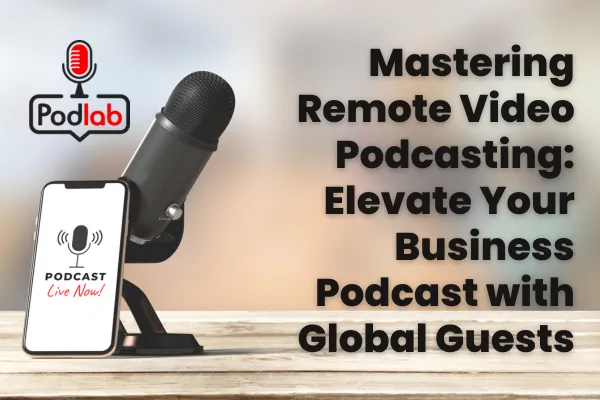PodLab Blog Posts

Mastering Remote Video Podcasting: Elevate Your Business Podcast with Global Guests
Remote Video Podcasting: Elevate Your Business Podcast with Global Guests
In the dynamic world of business podcasting, recording video podcasts with remote guests has become a crucial strategy for businesses aiming to establish authority and attract new clients. This approach not only extends your reach but also enhances your content, making it more engaging and impactful. In this article, we’ll dive into the essentials of remote podcast recording, focusing on how to achieve professional remote podcast production that stands out.
Why Remote Video Podcasting is Great for Businesses
The ability to record a video podcast with remote guests allows businesses to connect with thought leaders, clients, and experts from across the globe, unrestricted by geographical boundaries. Here’s why this is vital for businesses looking to dominate their niche:
Global Reach: Remote podcast recording enables you to feature guests from diverse locations, bringing fresh perspectives to your audience. This not only enriches your content but also broadens your appeal, helping you capture a global audience.
Flexibility: The logistical ease of remote guest podcast setup means no more headaches from coordinating travel or in-person meetings. You can record at times that suit both you and your guest, making the process smoother and more efficient.
Cost-Effective: Avoiding travel expenses and venue costs allows you to reallocate resources to areas like high-quality remote podcasting equipment or targeted marketing efforts, ensuring you maximize your ROI.
Technical Excellence: Tools and Tips for High-Quality Remote Recordings
To produce a professional remote podcast production that resonates with your target audience, it’s essential to invest in the right tools and strategies. Here’s how you can ensure superior quality in your remote video podcasts:
1. Choosing the Right Software
While platforms like Zoom are popular for meetings, they often fall short in delivering the high-quality remote podcasting experience you need. Instead, opt for specialized video podcast software for remote interviews that guarantees superior sound and video quality.
Top Recommendations:
Riverside.fm: Known for its pristine audio and video, Riverside.fm is ideal for those seeking professional remote podcast production.
SquadCast: Provides excellent audio quality and offers seamless integration with podcasting tools.
Zencastr: This platform records separate tracks for each guest, simplifying post-production and ensuring optimal quality.
2. Investing in High-Quality Equipment
To stand out, investing in the right equipment is non-negotiable. Here’s what you’ll need:
Microphone: A key component of high-quality remote podcasting equipment is a reliable microphone. USB options like the Audio-Technica ATR2100x or XLR microphones like the Shure SM7B offer crystal-clear audio.
Camera: For video, while dedicated cameras are ideal, modern smartphones can also deliver exceptional results for your video podcast with remote guests. Position your camera at eye level for a natural, professional appearance.
Lighting: Good lighting is crucial. Ring lights or softbox lights can help ensure you and your guests are well-lit, which is essential for maintaining a professional remote podcast production.
Headphones: Prevent audio feedback by using headphones, allowing you to monitor sound quality during the recording.
3. Optimizing Your Recording Environment
A well-prepared environment is key to professional remote podcast production. Here are some tips:
Soundproofing: Minimize background noise with soundproofing materials like foam panels or heavy curtains.
Background: Keep your background clean and uncluttered. Alternatively, use a virtual background that aligns with your brand’s image.
Internet Connection: A stable, high-speed connection is vital. Using an Ethernet cable rather than Wi-Fi can significantly reduce the risk of connection issues during recording.
Preparing Your Guests for Success
Your podcast’s success hinges on the quality of your guest’s contributions. To ensure a seamless remote guest podcast setup, guide your guests through the following steps:
Pre-Recording Checklist: Provide a checklist that covers essential high-quality remote podcasting equipment, camera positioning, and ensuring a stable internet connection.
Test Run: Schedule a brief test session before the actual recording to resolve any technical issues.
Environment Preparation: Advise your guests to find a quiet, well-lit space. Encourage the use of headphones to prevent audio feedback.
Maximizing the Impact of Your Remote Video Podcast
Once your podcast is recorded, it’s time to maximize its reach and effectiveness. Here’s how:
Post-Production: Edit your podcast to balance audio levels, eliminate background noise, and add professional touches like intros and outros. For video, consider adding branded graphics or lower thirds to enhance your video podcast with remote guests.
SEO Optimization: Leverage keywords like remote podcast recording, business podcasting strategies, and how to record a podcast remotely in your show notes and transcriptions. This will improve your podcast’s discoverability on search engines.
Promotion: Promote your podcast across social media, through email newsletters, and on your website. Collaborate with your guests to cross-promote episodes, further extending your reach.
Conclusion: Elevate Your Brand with Remote Video Podcasting
Remote podcast recording offers a powerful way for businesses to connect with a global audience, establish industry authority, and generate new leads. By investing in high-quality remote podcasting equipment, using the right video podcast software for remote interviews, and ensuring a professional remote guest podcast setup, you can produce content that not only captivates your audience but also helps you achieve your business goals.
Ready to elevate your business with a professional podcast? Whether you're just starting out or looking to take your podcast to the next level, PodLab can help you become a market leader and attract more clients. Book a FREE podcast consultation call with us today and let's discuss how we can make podcasting a powerful tool for your business. Click here to schedule your session now!
Happy podcasting!

Navigation
Contact Us
© 2023 All Rights Reserved
Podlab.agency

